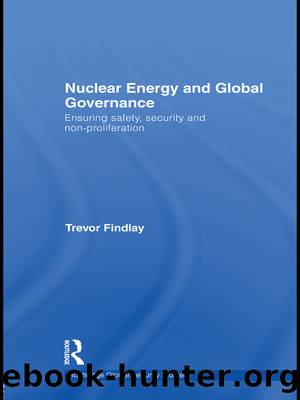Nuclear Energy and Global Governance: Ensuring Safety, Security and Non-Proliferation by Trevor Findlay

Author:Trevor Findlay [Findlay, Trevor]
Language: eng
Format: epub
Tags: Technology & Engineering, Nuclear, General, Political Science, World, Power Resources, Security (National & International)
ISBN: 9781136849930
Google: PAysAgAAQBAJ
Goodreads: 17581548
Publisher: Routledge
Published: 2009-06-01T00:00:00+00:00
Security Council Resolution 1540
Adopted in April 2004 by the United Nations Security Council under Chapter VII of the UN Charter, which makes it legally binding, Resolution 1540 obliges all states to refrain from providing support or assistance to non-state actors seeking to acquire so-called weapons of mass destruction (WMD) â normally taken to mean nuclear and radiological, as well as chemical and biological, weapons. The resolution3 also requires states to adopt and enforce appropriate and effective laws that prevent non-state actors acquiring WMD or related materials and technologies. With respect to nuclear material, 1540 requires all states to develop and maintain: measures to account for and secure such items; âappropriate and effectiveâ physical protection measures; âappropriate and effectiveâ border controls and law enforcement agencies; and national export and trans-shipment controls. The resolution is thus both a nuclear security and a non-proliferation measure. Unfortunately, the Council did not prescribe the characteristics of the steps that states were required to take, nor did it define âappropriateâ or âeffectiveâ. All UN member states are required, however, to report to the Council on their compliance with the resolution. To ensure implementation and facilitate compliance, the resolution established a 1540 Committee comprising Security Council members, furnished belatedly with some secretariat and expert assistance.
Resolution 1540 is a valuable, novel addition to global governance in the nuclear area, especially in drawing attention to the importance of national implementation measures to ensure nuclear security and in obliging all states, not just those party to the relevant international treaties, to comply with the will of the Security Council in this regard. It can also play a useful role in matching needy states with those which can provide assistance.
Yet it would be wise not to put too much store in the resolution in dealing with the challenges of a nuclear energy revival. First, the resolution is very broad. It deals with all types of WMD and even within the nuclear category the focus is on legacy materials and installations from weapons programmes, not civilian uses. While civilian nuclear energy will benefit in the long run from better national nuclear security and non-proliferation measures, nuclear power generation barely rates as a concern of 1540. Second, compliance with 1540 has been slow and uneven. As of April 2010, 157 countries out of 192 (82 per cent), along with the EU, had submitted national reports to the 1540 Committee (1540 Committee 2010) but this level of compliance has taken years to achieve. Many developing countries lack the capacity and expertise to even meet the reporting requirements of 1540, much less undertake the substantive steps to strengthen national implementation required. Sub-Saharan African countries, for instance, are âlittle inclined to divert scarce resources for implementing nonproliferation obligationsâ (Heupel 2007: 6â7). Among such states are several that have expressed interest in nuclear energy (Ghana, Kenya, Namibia, Nigeria, Senegal and Sudan).
A Stanley Foundation study confirms that implementation remains slow and uneven, âin part due to the incredible diversity of different national circumstances and the lack of rationalized machinery at the global levelâ (Stanley Foundation 2009: 2).
Download
This site does not store any files on its server. We only index and link to content provided by other sites. Please contact the content providers to delete copyright contents if any and email us, we'll remove relevant links or contents immediately.
Learning SQL by Alan Beaulieu(6283)
Weapons of Math Destruction by Cathy O'Neil(6270)
Digital Minimalism by Cal Newport;(5751)
iGen by Jean M. Twenge(5409)
Sapiens by Yuval Noah Harari(5367)
The Age of Surveillance Capitalism by Shoshana Zuboff(4286)
Elon Musk by Ashlee Vance(4123)
Thing Explainer by Randall Munroe(3932)
Apollo 8 by Jeffrey Kluger(3707)
Future Crimes by Marc Goodman(3596)
The Science Book (Big Ideas Simply Explained) by DK(3279)
The Innovators: How a Group of Hackers, Geniuses, and Geeks Created the Digital Revolution by Walter Isaacson(3177)
Who Can You Trust? by Rachel Botsman(3132)
I Live in the Future & Here's How It Works by Nick Bilton(2996)
Infinite Energy Technologies by Finley Eversole(2980)
Steve Jobs by Walter Isaacson(2894)
Dawn of the New Everything by Jaron Lanier(2770)
Chernobyl by Serhii Plokhy(2537)
Ben Franklin's Almanac by Candace Fleming(2528)
